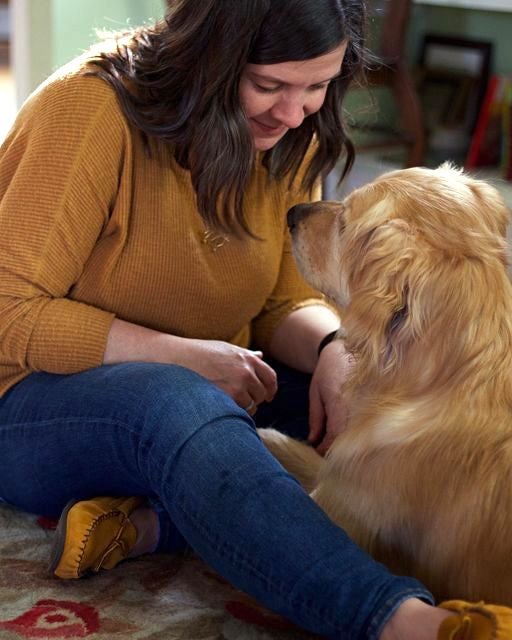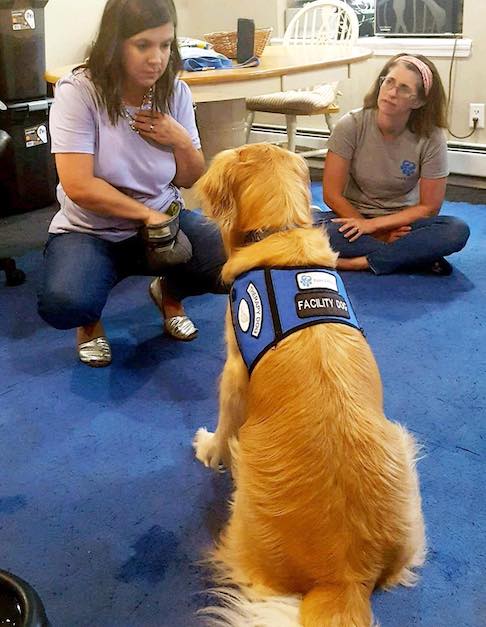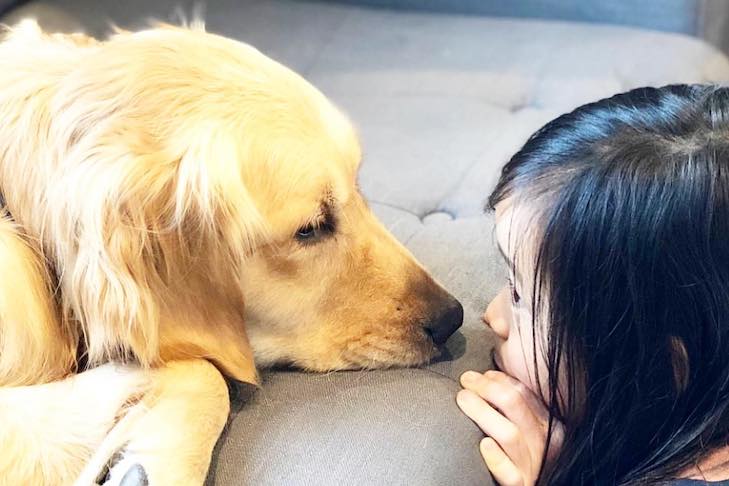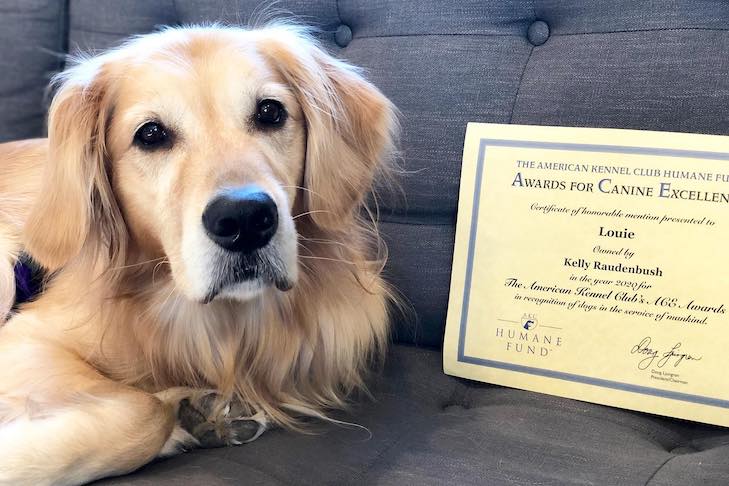
If you’re looking for a job description for Louie, you better sit down and set aside a few minutes.
Kelly Raudenbush, a child and family therapist at The Sparrow Fund in Phoenixville, Pennsylvania, and the 4-year-old Golden Retriever’s owner-handler, will only smile and tell you how he has grown into his job as a co-therapist since June 2018 helping children adopted from trauma form bonds and connections with their new families. In the process, he has settled into knowing what Raudenbush seeks from him but what he likes to do, too.
“Therapy should be fun,” she emphasizes, “It shouldn’t be something that makes families’ hearts sink when they see it on their calendars. It’s work, yes, but it should be something that prompts families to smile.”
Her clients are parents with foster and adoptive children navigating the effects of trauma while establishing trust and relationships.
In that respect, you might say she walks the walk since she and her husband, Mark, have three biological children and a daughter who was adopted as a toddler from China in 2010.
A year later the couple founded The Sparrow Fund, and Kelly, an admitted “dreamer,” began searching for new ways to engage families and offer opportunities for all to connect and focus on established priorities.
Her eventual vehicle seven years later turned out to be Louie.
But first things first.

Project Puppy Love
“The idea for Project Puppy Love,” Raudenbush recalls, “started with a conversation with our team that began with me saying, ‘Wouldn’t it be cool if . . . ?’ I found myself imagining all sorts of opportunities that having a dog in the clinical space not just present, but involved, could offer to families.”
It remained just a ‘cool idea’ for a while as Raudenbush was growing her confidence and competence as a clinician. Eventually, she began researching therapy-dog usage online, “and then things started moving forward as doors began opening and my interest grew at the same time.”
With that distant dream still intact, Raudenbush connected with Paws & Affection in Philadelphia. “I reached out via e-mail to their team and cautiously shared my crazy idea,” she recalls. “They responded immediately and arranged a phone call the next day. I remember, the director Laura (O’Kane) on that call saying, ‘I think we may have the dog for you.’ “
Enter Louie.
He was brought into the P&A program initially for service-dog training. A quick learner and adored by the entire staff, he threw them a bit of a curveball with his anxiety in public spaces and preference for hugs over typical service-dog tasks.
While P&A administrators could have pressed on and continued to train him for more traditional service work. They prioritize listening to what each dog is telling them about what he or she wants to do.
“When they heard me talk about involving a dog in family therapy, they heard me describe exactly what they believed Louie would want to do.”

Louie’s Perfect Match
And Louie hasn’t disappointed with his sweet, calming and sometimes silly demeanor, the perfect formula for interacting with children experiencing high stress and anxiety. “It’s all about building safety and trust,” Raudenbush adds.
Before Louie’s placement, Raudenbush completed 50 hours of training with the P&A team. “And they have continued to support us on-site to make certain we were set up for success,” she says. “I know my limits. I’m a therapist and not a professional dog trainer. Having them 35 minutes and a phone call away, has been invaluable.”
Whether Louie is utilized with a new family is a collective decision. The Sparrow Fund intake form asks about the client’s interest in canine-assisted therapy before the first visit. “Then we talk about it, what it might look like in practice and why we offer it. If the parents aren’t comfortable with it that really is OK.”
Louie’s role is helping establish a comfort zone for all, particularly the children, and making each visit fun.
Raudenbush knew she was headed in the right direction early on with Louie when an upset stomach earned him a sick day. A disappointed little girl who attended a session with her dad felt Louie’s absence right away, saying, “Louie helps me focus because he keeps my hands busy.”
On The Sparrow Fund website, Raudenbush articulates, “The fancy way to say that is that he promotes self-regulation in the repeated motion of petting and the sensory input of long, soft fur and of deep pressure when he lays his head or whole body on people’s laps. But there are other ways he makes hard things easier. For example, I’ve noticed how much easier it is for kids – particularly teenagers – to talk about hard things when they are able to focus attention on Louie and have their parents and me gazing at him, too, instead of at them. He seems to bring out more words and feelings.”

Canine Co-therapist
One of the goals The Sparrow Fund has for children is to help equip them to identify and express their feelings. At every get-together, everyone practices sharing emotions, specifically their mads, sads, glads and scareds. So it was only fitting the canine co-therapist do the same. Yes, Loue has been trained to demonstrate the four feeling words and in the process serves as an incentive and reward for the kids to share their own.
The magic that Louie offers, Raudenbush explains, comes in small, simple interactions with children and families rather than big epiphanies. “Children who may feel unlovable get the joy of experiencing Louie’s excitement to see them. Those who may feel unable get the experience of successfully leading Louie. Kids who may struggle to give and receive affection get to safely practice both.
Raudenbush notes, “He just makes hard work more fun. One child recently said, to me, ‘I don’t so much like you, but I do like your dog.’ I simply replied, well, that makes a lot sense to me. I ask you to do a lot of hard work. I’m really glad Louie makes it a little easier for you. I like him, too.”
The therapist recalls an appointment with a Mom, Dad and a young girl who had been adopted out of foster care after suffering severe abuse before becoming their daughter. Louie greeted her gently as if he sensed her hesitancy to risk another potentially harmful relationship.
“At one point, she stood up to work with him but became nervous. She put her hand out to offer him a cue, but it was barely noticeable at her side. Louie walked over and rather than respond to the cue, he laid his head against her stomach, standing up, looking up at her face. She said, ‘Miss Kelly, I think he knew I was scared.’ It was the first time she expressed a scared feeling.”

Off the Clock
There’s a bit of irony in the Louie story, too. Raudenbush’s husband, Mark, for years resisted adding a dog to the family. “We were busy with work and raising children and he just felt the responsibility of pet ownership was a bit much. Now, he and Louie are best buds,” Raudenbush smiles.
The 58-pound Golden’s demeanor doesn’t change a lot off working hours. As the six-member family has all been around home chiefly, he meanders around for a hug (he pushes his head against people’s legs as a hug and remains within reach if any heightened emotion flares anew.
He isn’t without his quirks, says Mom. “He has a weakness for stuffed toys and tears them apart within minutes and loses all his manners at the sight of water. The boy loves to swim. His favorite thing to do with me for fun is to walk around a nearby creek where I let him run off-leash like a toddler playing in a park fountain.”
And if you’re wondering who’s training who, Louie puts that to rest at home. When he wants a snack, he often start executing some of his skills on his own – like opening and closing kitchen cabinets, retrieving dish towels and such. Usually it works!
P.S.: Louie and Raudenbush were finalists in the 2020 AKC ACE Awards Therapy Dog category.

